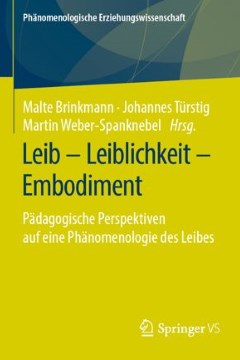Repository | Book | Chapter

(2019) Leib – Leiblichkeit – Embodiment, Dordrecht, Springer.
Dieser Beitrag thematisiert und problematisiert den Einsatz von Augmented-Reality-Technologie (AR) in pädagogischen Kontexten. Ausgehend von Husserls Überlegungen zur passiven Synthesis und Merleau-Ponty's Anmerkungen zur allgemeinen Synästhesie leiblicher Erfahrungen fragen die Autoren nach den Implikationen des Einsatzes von AR. Es werden drei Einwände vorgebracht, die diesen problematisch werden lassen: 1) das Problem der künstlichen Transformation von Umwelt, 2) das Problem der leiblichen Wahrnehmung durch Bevorzugung visueller Eindrücke und 3) die Unterdrückung emergenter Zugänge zu Welt zugunsten einer präformierten Aufmerksamkeitsstrukturierung. Vorbehalte für pädagogische Anwendungen ergeben sich dann aus der limierten Responsivität, der Fixiertheit des Lerngegenstands und dem Vorrang der Medialisierung vor der Auseinandersetzung mit dem Gegenstand, wie unter Bezug auf die phänomenologische Theorie des Lernens und der Negativität (Brinkmann, Rödel) deutlich wird.This contribution deals with and problematizes the use of Augmented Reality Technology (AR) in educational contexts. With reference to Husserl's work on passive synthesis and Merleau-Ponty's comments on the synesthesia of bodily experiences, the authors begin by asking about the implications of the use of AR in general. They present three specific problem areas for the use of AR, which are: 1) the problem of the artificial transformation of the environment, 2) the tendency of AR to privilege visual modes of world perception, and 3) the suppression of emergent approaches to the world in favor of preformed attention structuring. In the context of pedagogy, these objections pose significant problems, such as the limitation of student responsiveness, the fixation of the subject matter of learning, and the subordination of direct to mediated encounters with the world. These implications are further explored in dialogue with current phenomenological theories of learning and negativity (Brinkmann, Rödel).
Publication details
DOI: 10.1007/978-3-658-25517-6_22
Full citation:
McGuirk, J. , Buck, M.F. (2019)., Leibliche (Lern-)Erfahrung qua Augmented Reality, in M. Brinkmann, J. Türstig & M. Weber-Spanknebel (Hrsg.), Leib – Leiblichkeit – Embodiment, Dordrecht, Springer, pp. 405-423.
This document is unfortunately not available for download at the moment.



